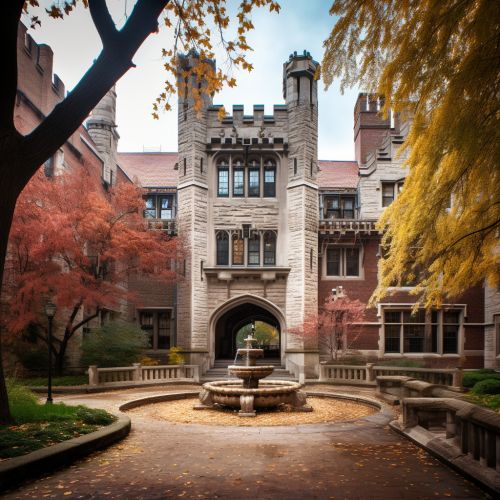Chicago School (sociology)
Origins and Development
The Chicago School is a school of thought in sociology that emerged from the University of Chicago in the early 20th century. The term "Chicago School" was first used by sociologist Louis Wirth in his 1927 article "The Ghetto". The school's approach to sociology was characterized by a strong emphasis on empirical research and the use of ethnographic fieldwork or urban studies. This approach was a departure from the more abstract theorizing of sociologists such as Émile Durkheim and Max Weber.


The Chicago School was influenced by a variety of intellectual traditions, including pragmatism, social ecology, and symbolic interactionism. It was also shaped by the unique urban environment of Chicago, which at the time was experiencing rapid growth and demographic change. The city's diverse population and complex social problems provided a rich laboratory for the school's researchers.
Key Concepts and Theories
The Chicago School is perhaps best known for its contribution to the development of the theory of symbolic interactionism. This theory, which emphasizes the role of symbols and meaning in social interaction, was developed by Chicago School sociologists such as George Herbert Mead and Herbert Blumer. The school is also associated with the development of the concept of social disorganization, which refers to the breakdown of social control in a community or society.
Another key concept associated with the Chicago School is the idea of the "social self". This concept, which was developed by Mead, argues that the self is not a static entity, but is constantly being constructed and reconstructed through social interaction.
The Chicago School also made significant contributions to the field of urban sociology. The school's researchers conducted detailed studies of various aspects of urban life, including crime, family structure, and neighborhood dynamics. These studies often used innovative research methods, such as participant observation and life histories, to gain a deeper understanding of social phenomena.
Criticisms and Controversies
While the Chicago School has been highly influential in the field of sociology, it has also been the subject of various criticisms. Some critics argue that the school's emphasis on empirical research and fieldwork has led to a neglect of theoretical development. Others have criticized the school's focus on urban sociology, arguing that it has resulted in a lack of attention to other important social phenomena.
Despite these criticisms, the Chicago School remains a major force in sociology. Its emphasis on empirical research and its innovative research methods continue to be widely used in the field. Moreover, the school's theories and concepts, such as symbolic interactionism and social disorganization, remain central to sociological thought.
Legacy and Influence
The influence of the Chicago School can be seen in a wide range of areas within sociology. The school's emphasis on empirical research and fieldwork has had a major impact on the way sociological research is conducted. Its theories and concepts have also shaped the development of various subfields within sociology, including criminology, urban sociology, and the sociology of education.
In addition to its influence within sociology, the Chicago School has also had a significant impact on other disciplines. For example, its research methods and theories have been adopted by anthropologists, social psychologists, and geographers.
